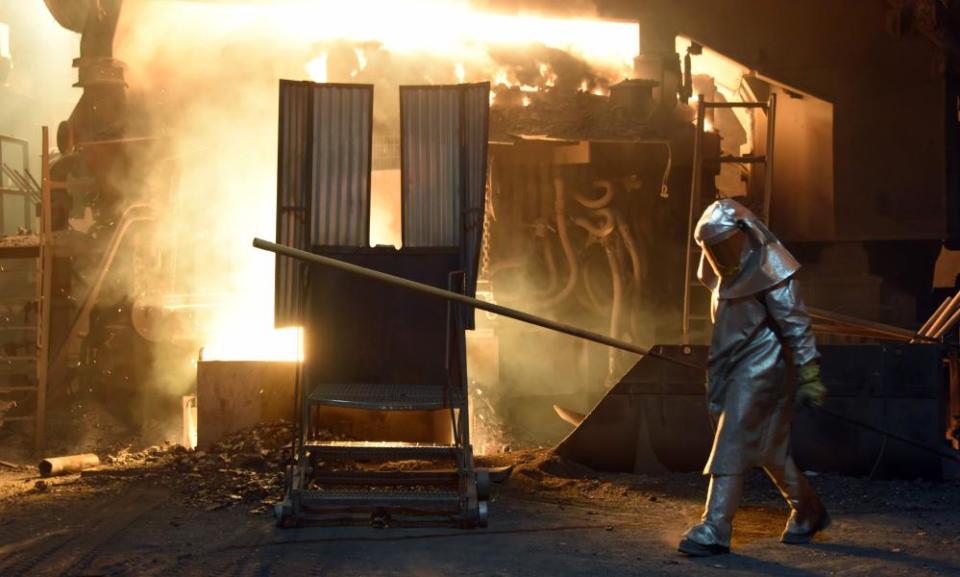US steelworkers say Trump tariff plan has appeal – 'but about 40 years too late'
Workers in Pennsylvania, once a steel hub, are conflicted about the tariffs proposal and fear Trump could just be playing politics

To say former steelworkers in Pennsylvania’s Lehigh Valley are conflicted about Donald Trump’s 25% tariff on steel imports is not quite to capture the mood.
Those who voted for the president see the tariff as a fulfilment of a campaign promise, proof he is a man of the people and, what’s more, his word. Those who never supported Trump do not see it that way.
Here is a man who used foreign steel to build his own buildings, they think. Who hires foreign workers and relies on foreign money. Someone who does not have to worry what a car costs – or a can of soup, for that matter. A politician who is just trying to win the special election next week in Pittsburgh. Who might not even follow up.
But at the same time, they admit the potential appeal of the tariff announcement. They wonder what would have happened if the government had acted more aggressively to defend the steel industry 40 or 50 years ago. And they concede that the president got the rollout right.
“The president was so smart about how he did this, and it breaks my heart to ever say those words,” said Frank Behum, who worked for 32 years at Bethlehem Steel, which once employed thousands of people regionally but closed in the mid-1990s.
“This was all a set-up for the US representative’s race in the 18th district, a little south-west of Pittsburgh. This is what our president will do to muddy the waters, and I don’t think the steel workers are going to fall for it.
“But they’re not so dumb as they’re not going to accept it, either.”
Pittsburgh is home to US Steel, the country’s second-largest producer. Democrats have a chance to grab the 18th district in a special election on Tuesday, in a race in which steelworkers, unions and other groups paying close attention to the tariffs issue could play a pivotal role.
Trump’s focus on the congressional race was underscored by his appearance at a raucous campaign-style rally outside Pittsburgh on Saturday night, in support of Republican Rick Saccone.
“Your steel is coming back,” he said. “It’s all coming back.”
“They’re opening a lot of the steel mills up because of what I did,” he claimed. “Steel is back and aluminium is back too.”

That was a message that resonated with Trump supporters such as Bruce Haines, a former US Steel executive who called the tariff “long overdue”.
“Steel and aluminum tariffs are necessary to protect from unfair dumped steel,” Haines wrote in an email.
“Like the tax cuts, only Trump has the balls to pull this off. In this case he is fulfilling his campaign promise to Pennsylvania, Indiana, Ohio, Illinois and Missouri, while also helping West Virginia and Kentucky reopen coal mines needed for steel, as well as getting the Minnesota iron ore mines back up and running – all employing the forgotten American worker that crossed the aisle to vote for Trump.”
Multiple former steelworkers, though, pointed out that the US steel industry is a long way from being able to meet US demand, no matter how high the president’s barriers to entry.
Frank Hawkey worked 31 years at Bethlehem steel. “These tariffs here are such a joke,” he said. “Every time you open up a can of vegetables, it’s either aluminum or steel. And they’re not getting that from the United States.
“The mills that have been shut down in the USA are now brownfields. There’s nothing left there. You could just survey Pittsburgh, Ohio – there’s a few plants going, like in Indiana, but they can’t supply everything.”
Larry Neff worked at Bethlehem Steel for 25 years. “Many of my brothers think it’s about 30 to 40 years too late,” he said. But he warned that the picture was no longer so simple.
“These tariffs will just start a trade war which will cost the American consumer more to purchase items,” he said. “None of the older plants could be started up again, and many of the mills producing steel now are owned by other countries.”
In a response to Trump’s tariffs on Friday, European Commission president Jean-Claude Juncker fueled fears of a trade war, declaring: “We can also do stupid.”
Haines said those fears were overblown. “This will be fun to watch play out,” he said. “Trump is too smart to get in a trade war which would jeopardize our economy, in my opinion.”
In another begrudging point for the president, Behum pointed out that many former Bethlehem Steel employees in the Lehigh Valley have health and other benefits that are currently paid for, thanks to industry consolidation, by Luxembourg steelmaker ArcelorMittal, which produces steel in the US and could stand to gain from the tariff.
Neff doubted that Trump cared about steelworkers, pointing out that Chinese steel had been used in Las Vegas and Chicago to build Trump hotels.
“Don’t stay there if you go,” said Neff, the author of the entertaining steel memoir Rigger. “You may go to sleep on the eighth floor and wake up on the third floor. We ex-steel hangers call that a Chinese accordion.”

